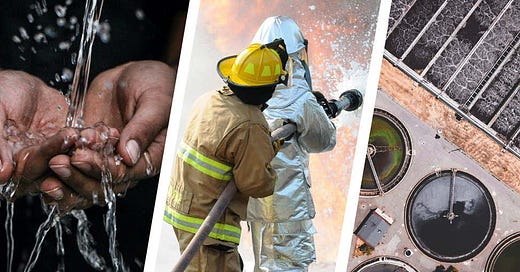This news update is part of a series on PFAS (per- and polyfluorinated alkyl substances, "Forever Chemicals") in drinking water. You can read all the previous posts here.
It's Thanksgiving week here in the USA. This year, I'm giving thanks to my friends from PFAS-affected communities across the state, at our environmental non-profits, and at the EPA and the State Departments of Ecology and Health, for the following pieces of good news that I have to share about PFAS in my home state and further afield.
First, Washington State Department of Ecology has quietly released a PFAS Statewide Funding Strategy: Four-Year Plan for Prevention, Reduction, and Mitigation in Washington State.
In March this year, we reported on this Funding for PFAS, including on a letter to Ecology that several of us from PFAS-affected communities cosigned with Toxic-Free Future and other environmental organizations. In June this year, several signatories of the letter met with the director of Ecology to discuss this further.
In case you think that you can't make a difference, here's a direct quote from the Funding Strategy Document:
In March 2024, Ecology received a comment letter from a coalition of environmental advocates, including Toxic-Free Future, Zero Waste Washington, and Puget Soundkeeper Alliance, among others. In June 2024, Ecology representatives met with Washington residents affected by PFAS in drinking water. In both cases, the strategy was modified to account for information received.
The Strategy document is 88 pages long. I'll be back with a more complete review in due course. For now, I'll point out that it addresses two concerns: that state agency staff often operate in silos and that a coordinated approach is needed; and that funding is similarly fractured into multiple programs that can both overlap and leave gaps, and that a centralized funding source is needed. Both are music to my ears.
The funding still needs to make it through the legislature in a tough budget year. I'm here to help.
Secondly, following the June meeting with the Director of Ecology, I sent a letter to the EPA Region 10 Administrator and to the Ecology Director asking the EPA to help Ecology with testing private wells for PFAS around rural fire stations on Whidbey Island and elsewhere. A flurry of emails resulted in a meeting between me, EPA, Ecology, and Health, resulting in an agreement to set up a pilot study, probably here on Whidbey, to test private wells and smaller water systems around one of the water systems that has tested positive.
I've since learned that the pilot study may be expanded, with the funding above, into a statewide prioritized testing program, while EPA Region 10 is looking at rolling out something similar throughout the region, so in Alaska, Idaho and Oregon in addition to Washington. More what I have it, probably in the new year.
Happy Thanksgiving to those who celebrate!
Thanks, as always, for listening or reading. Next week we’re leaving for New Zealand for the month of December. I expect to have plenty to write about!
The work described in this post took me many hours. If you value this work and feel moved to support it, a paid subscription to Mostly Water is a great way to do that, and of course I’m always grateful for your comments, likes, and shares.






This is a Wow Wow Wow oh my god post, John. The persistence of you and others on this issue of contamination in drinking water and I presume elsewhere in the environment resulted in this major response. Now it sounds as if the pilot study will be expanded to include other states? To me, it's a miracle how (in your case very informed) citizen activism brought about change. You deserve your wonderful trip to celebrate. Thanks for sharing this.